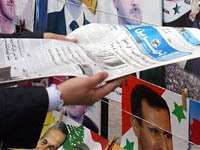Syrian president takes advice from Iran on how to handle uprising against his rule
Thousands of emails purported to be from the private accounts of Bashar Assad and his wife show the Syrian president took advice from Iran on how to handle the uprising against his rule, joked about his promises of reform and bypassed U.S. sanctions to shop on iTunes, the Guardian newspaper reported Wednesday.

The newspaper said it got the trove of emails from a member of the Syrian opposition whom it does not identify. The documents are said to have been intercepted by members of the Supreme Council of the Revolution between June and early February, according NPR.
Asma Assad seems to be mostly occupied with the purchase of luxury goods. Many of the emails the Guardian obtained are correspondence regarding the purchase of shoes, candle sticks, furniture, and jewelry from London and Paris retailers.
The Guardian emails reveal a cocooned life shielded from the violence engulfing the country. The United Nations says Assad's security forces have killed more than 7,500 civilians since the revolt began last March. Syria's government said in December that "armed terrorists" had killed more than 2,000 soldiers and police during the unrest, reports Haaretz.
"The people of Syria need our help," said Valerie Amos, the U.N. humanitarian chief. "They want peace, security and stability, so they can get on with their lives. We must do everything we can to stop the violence and end the suffering of people caught in the conflict." Things were no different early Thursday as activists reported shelling and a heavy security presence in many Syrian cities.
In Daraa, the place where the protests started, the city was in dire straits after more than 100 tanks stormed in, a local activist said. Two towns in Daraa province were surrounded by security forces keeping residents virtually locked in. Two civilians were killed by security forces in Idlib, according to the Syrian Observatory for Human Rights. Shelling continued Thursday in the besieged city of Homs, marking the sixth day of relentless attacks, says CNN.
FAO and WFP are currently running an emergency operation providing food aid and vouchers to 100,000 people in Syria. Food, water and fuel are reported to be increasingly difficult to obtain in several areas and the situation is also affecting the mobility for herds and limited access to veterinary drugs and other supplies. Some 300,000 small-scale farmers and herders in north-eastern provinces, which have already suffered four consecutive seasons of drought, are also affected by loss of opportunities from seasonal labor migration inside the country.
In addition, Syria's cereal production is estimated to have dropped by almost ten percent last year following late and erratic rains, and the outlook for this year's winter harvest, which starts in May, is uncertain given the possible disruption of farm activities and limited access to inputs as a result of insecurity, according to FAO, informs RTT News.
Subscribe to Pravda.Ru Telegram channel, Facebook, RSS!





